
Hong Kong marks 25th handover anniversary

Beijing supporter says Hong Kong needs mainland China’s help “to get things running again”
From CNN’s Kathleen Magramo in Hong Kong
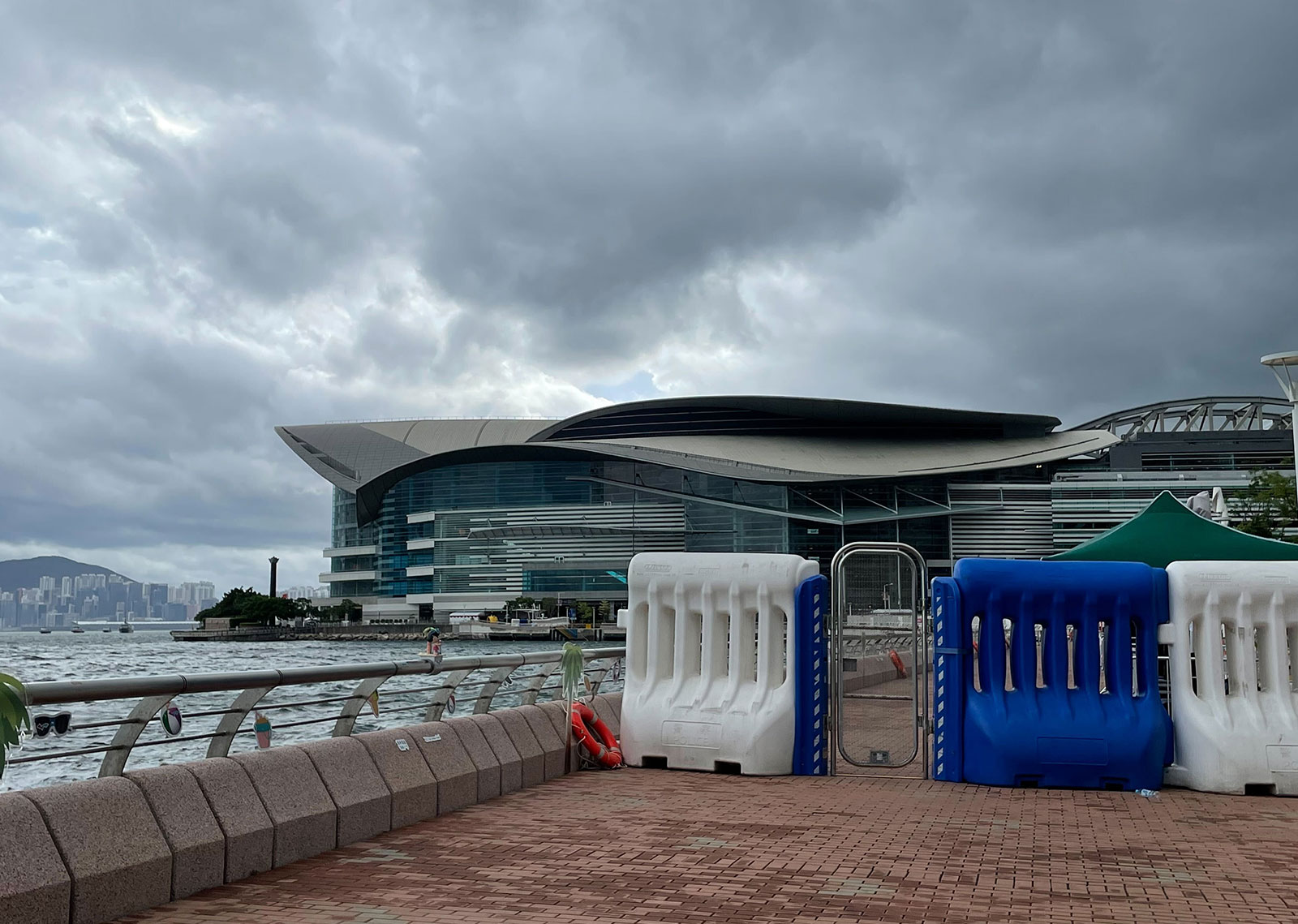
Hong Kong woke to dark skies on July 1, as Typhoon Chaba edged closer to the city, dimming the already muted tone for the 25th handover anniversary brought by heightened security and Covid-19 restrictions.
No signs of coordinated gatherings were seen at the Tamar Park harborfront, adjacent to the Hong Kong government’s offices on Friday morning — a stark contrast to the lively pro-democracy protests on this day of years gone by.
About a dozen joggers ran along the waterfront, occasionally stopping to take photos of the police marine vessels dotting the the harbor.
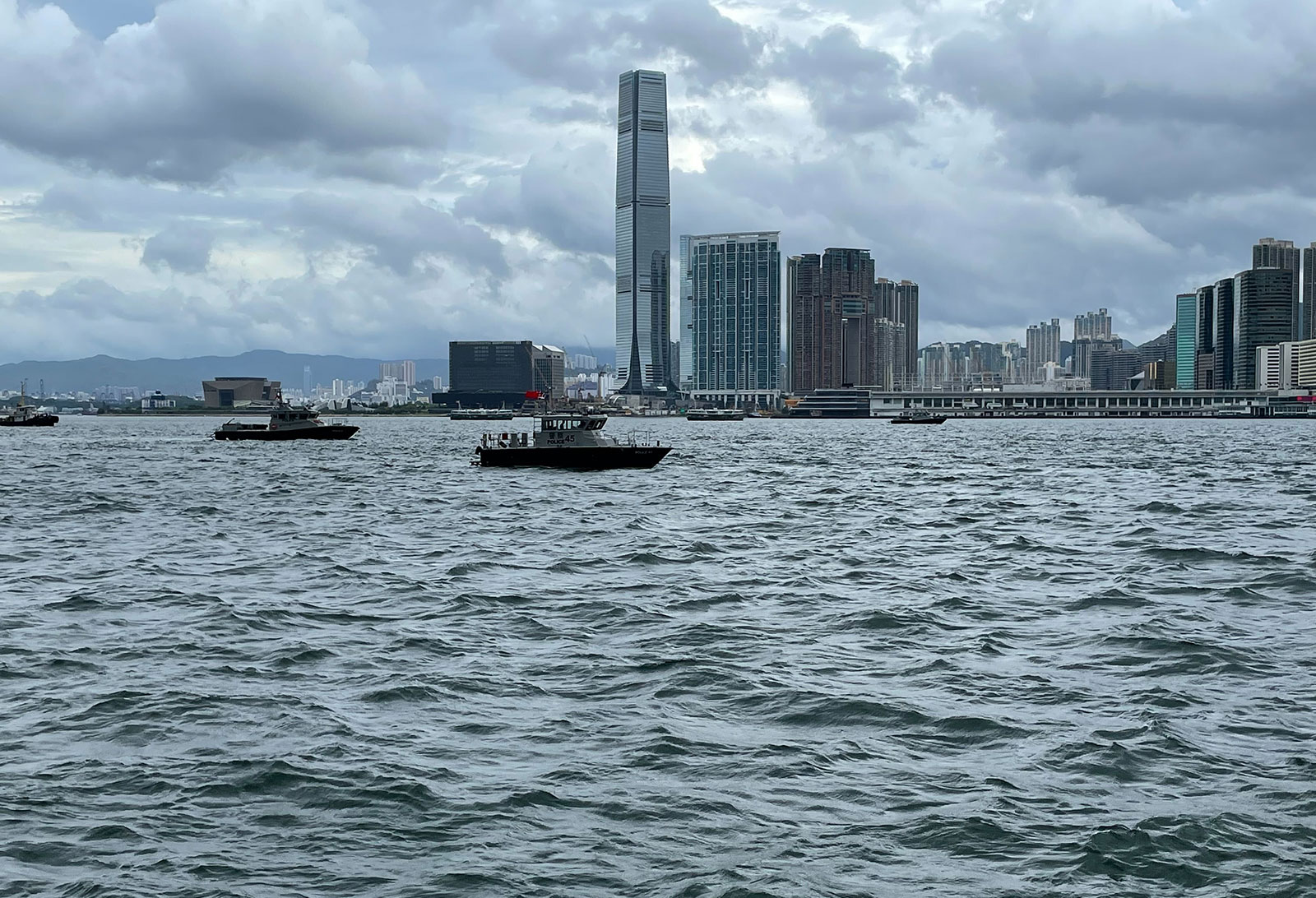
A trio of photography enthusiasts came to watch the police vessels and helicopters that held guard over Hong Kong during the flag raising ceremony.
“There’s really nothing to celebrate. The whole ceremony is highly guarded and the public isn’t invited anyway, just like how [the government] doesn’t want ordinary people to join political discussions anymore,” said one man, surnamed Tse, in his 20s.
A handful of Beijing’s supporters were also at the park.
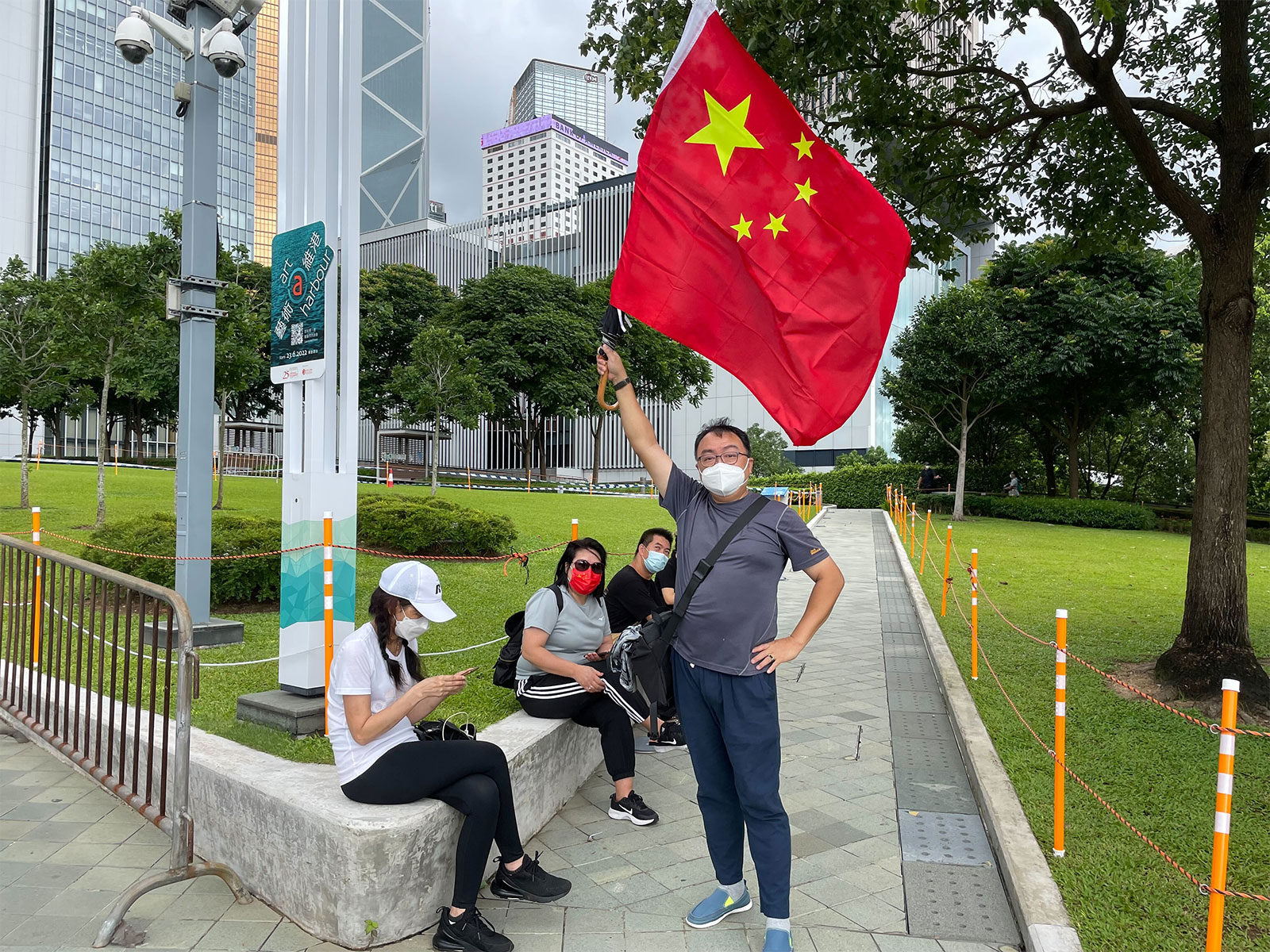
Paul Choi waved the national flag of China alongside two others, who had donned face masks with the print of the flag.
“We hope that the next Chief Executive, John Lee, will make the Hong Kong government stable again,” said Choi, who runs a volunteer association in the neighborhood.
“The economy and people’s livelihoods should be restored, and we need the help of mainland China to get things running again.”
No protests are expected in Hong Kong today. Here’s why
From CNN’s Kathleen Magramo, Hannah Ritchie and Eric Cheung
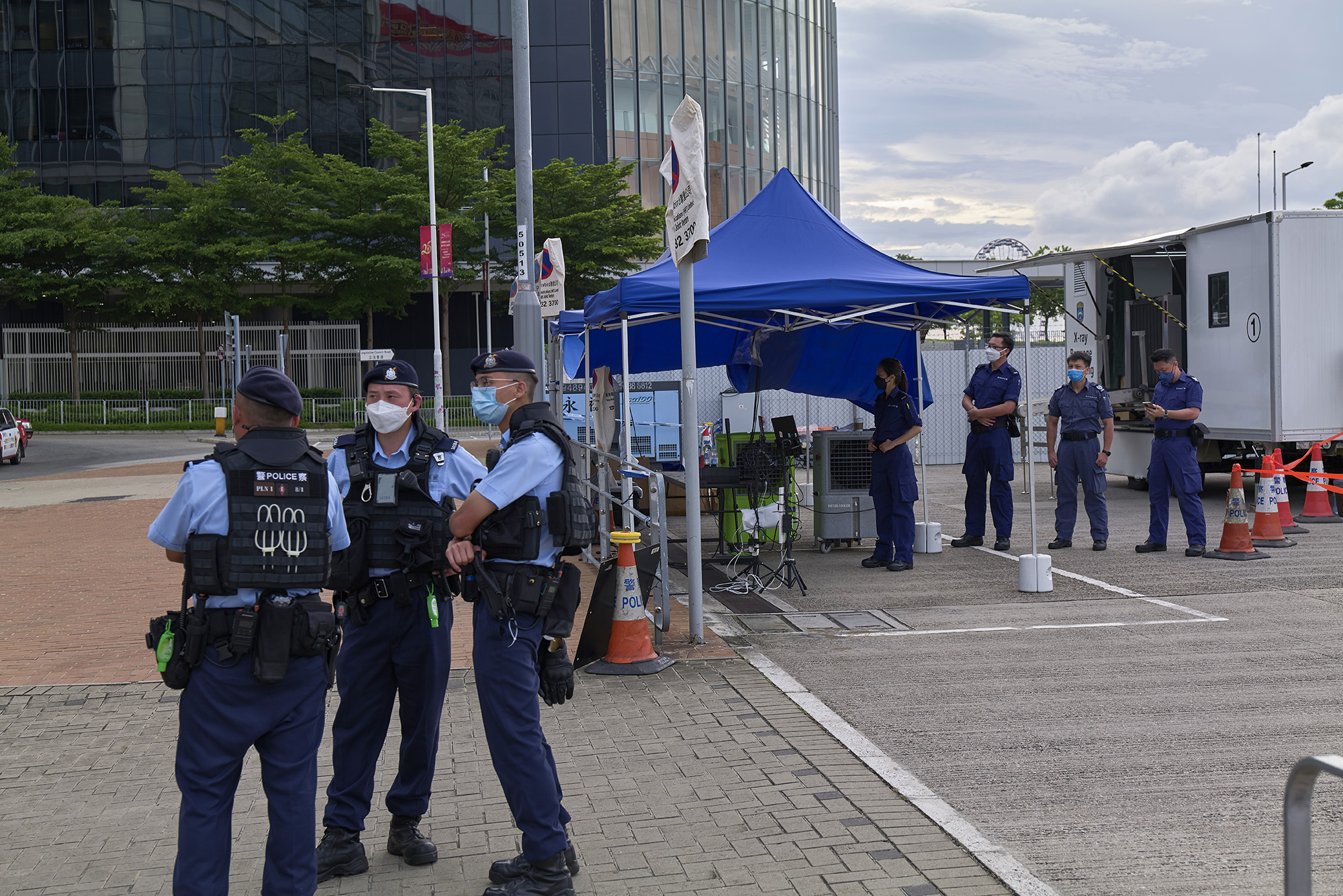
No applications have been made by pro-democracy organizations to stage peaceful protests during Chinese leader Xi Jinping’s visit to Hong Kong, according to the city’s police.
“Police will not tolerate any acts of violence or public disorder and will not tolerate anything that may interfere and undermine the security operation,” Hong Kong’s Assistant Police Commissioner Lui Kam-ho told a news conference on Tuesday.
He added that “resolute actions” would be taken against anyone who threatens “public order.”
National security law: Most Hong Kong pro-democracy groups have disbanded following the enactment of the city’s sweeping national security law two years ago. A subsequent crackdown saw nearly all of Hong Kong’s leading pro-democracy figures, including activists and politicians, either jailed or forced into exile.
The controversial law was passed by Beijing on June 30, 2020, following a year of mass anti-government protests in Hong Kong. It criminalizes acts of secession, subversion, terrorism and collusion with foreign forces to endanger national security — with a maximum sentence of life imprisonment for all four.
Critics of the legislation say it has been used to silence all dissent against the Hong Kong government, which has repeatedly defended the law, saying it has restored order to the city following the 2019 protests.
No protests: The League of Social Democrats, a pro-democracy political party in Hong Kong, said Tuesday it would not stage any protests as the city marks the 25th anniversary of the handover to Chinese rule.
“Today, some volunteers and friends of the League of Social Democrats were invited to meet with national security police. After assessing the situation, we will not stage any protest activities on July 1,” said Chan Po-ying, the party’s chairwoman. “The situation is difficult, and please accept our apologies.”
Some context: The League of Social Democrats has staged a number of small protests since the national security law came into effect. On June 4 this year, the anniversary of the 1989 Tiananmen Square massacre in Beijing, three members of the party briefly staged a demonstration in Hong Kong before they were arrested by police.
US Secretary of State slams “dismantling” of freedoms in Hong Kong
US Secretary of State Antony Blinken has criticized the “dismantling” of freedoms in Hong Kong, as the city marks its 25th anniversary of Hong Kong’s 1997 handover from Britain to Chinese rule.
“This date was envisioned as the halfway point of 50 years of promised autonomy under the ‘one country, two systems’ framework. Yet it is now evident that Hong Kong and Beijing authorities no longer view democratic participation, fundamental freedoms, and an independent media as part of this vision,” he said.
Blinken referenced the 2019 pro-democracy protests that rocked the city for six months, which were followed the next year by a sweeping national security law imposed by Beijing.
Blinken said the law “set the stage for an erosion of autonomy and dismantling of the rights and freedoms of Hong Kong residents over the last two years.”
“Authorities have jailed the opposition, with many imprisoned for more than a year. Hong Kong’s leaders have raided independent media organizations, shuttered museums and removed public works of art, weakened democratic institutions, delayed elections, prevented vigils, disqualified sitting lawmakers, and instituted loyalty oaths,” he said.
“Government officials have spread disinformation that grassroots protests were the work of foreign actors. They have done all of this in an effort to deprive Hong Kongers of what they have been promised.
“We stand in solidarity with people in Hong Kong and reinforce their calls for their promised freedoms to be reinstated.”
The Hong Kong government has repeatedly denied the national security law is suppressing freedoms. Instead, it insists the law has ended chaos and restored stability to the city.
On this day 3 years ago, Hong Kong protesters stormed the city’s legislature
From CNN staff
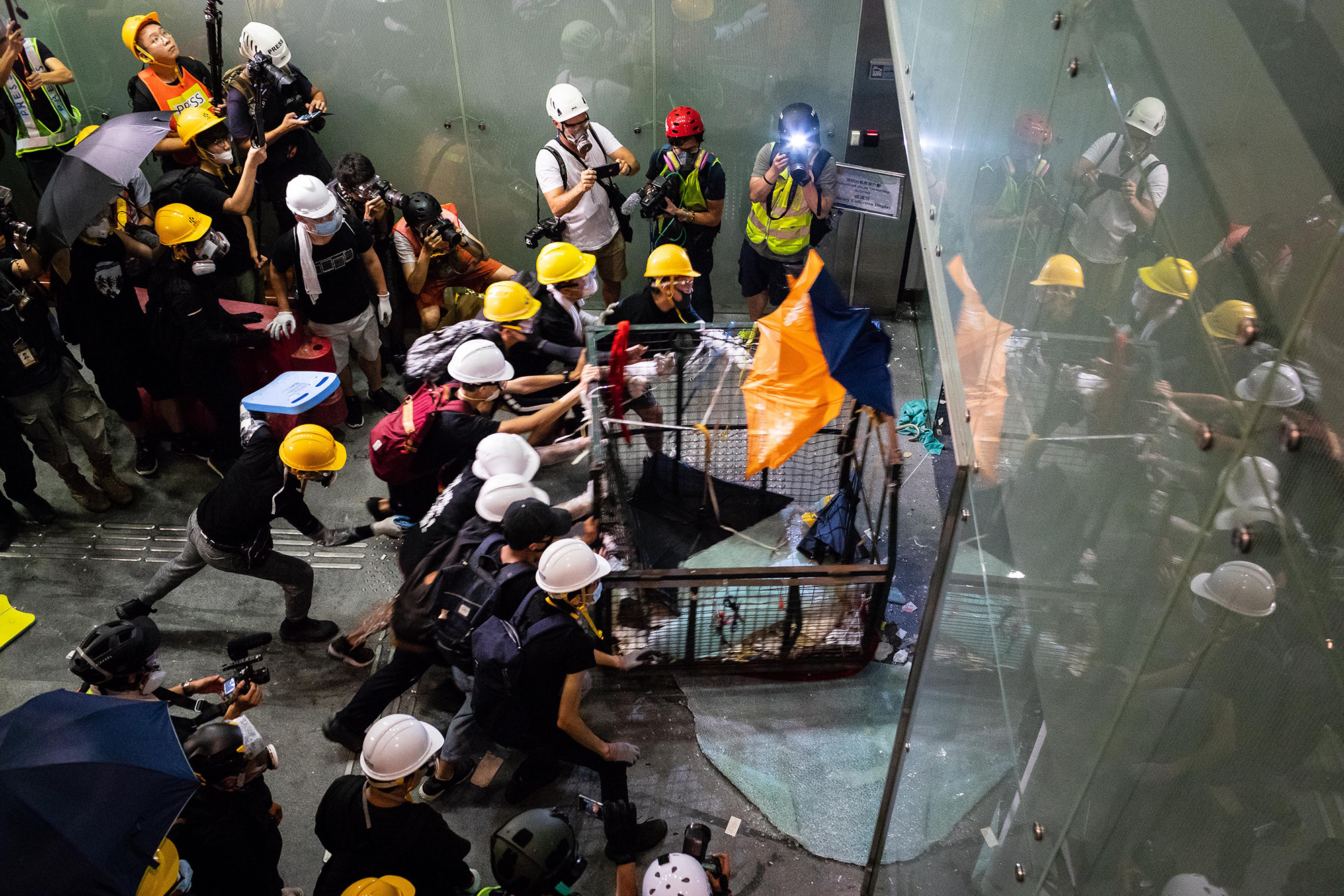
Before the pandemic and the enactment of the national security law in 2020, July 1 — the anniversary of Hong Kong’s handover from British to Chinese rule — was traditionally marked by pro-democracy marches.
On this day three years ago, turnout was boosted by anger over a proposed law that would have allowed extradition from the city to China, which brought hundreds of thousands of Hong Kongers into the streets, eventually forcing the government to suspend the bill.
Critics feared the law could be used to seize government critics and send them across the border to face trial in a system with a 99% conviction rate and a history of political prosecutions.
Before the main march got underway on July 1, 2019, a small, breakaway group of protesters — many of them in their teens and 20s and wearing masks, helmets and other protective gear — surrounded the Legislative Council complex.
Using makeshift battering rams and metal bars to smash through reinforced glass, members of the group forced their way into LegCo, where they daubed anti-extradition bill slogans on the walls, smashed the interior and draped the territory’s former colonial flag across the main chamber’s central podium.
Police did not act as protesters attacked the building or stormed inside, and hundreds were able to remain in the legislature for up to three hours, before word of an imminent clearance operation brought them back onto the streets.
Within minutes of protesters taking a collective decision to exit the building police fired tear gas and used baton charges to disperse the crowd.
The next day, Hong Kong’s then leader Carrie Lam condemned the protesters’ actions, saying they had used “extreme … violence and vandalism.”
The Chinese government’s reaction was similarly critical. A spokesman for the State Council’s Hong Kong and Macau Affairs Office said the “radical” demonstrations had been an “open challenge” to the city’s system of governance.
“This kind of severe illegal action damages Hong Kong’s rule of law, social order and hurts Hong Kong’s fundamental interests,” the statement said, adding that Beijing was fully behind the city’s police force.
How it’s viewed today: The storming of LegCo marked a turning point in the protest movement and China’s view of it. Exactly a year later, Beijing bypassed the city’s legislature to impose the national security law on the city, which critics say, has been used to crush the city’s opposition movement, overhaul its electoral system, silence its outspoken media and cripple its once-vibrant civil society.
Hong Kong leaders attend July 1 flag raising ceremony … but no sign of Xi yet
Chinese leader Xi Jinping did not attend a flag raising ceremony in Hong Kong on Friday morning, one of the rituals marking the 25th anniversary of the city’s handover to Chinese rule.
The Chinese flag was hoisted alongside the Hong Kong flag at the Wan Chai Convention Center, which overlooks the city’s harbor. The flags were raised as helicopters performed a flyby, also trailing the banners behind them.
Xi’s whereabouts have been heavily guarded and a detailed itinerary of his visit has not been released. The security in the city is at unprecedented levels and includes a heavy police presence, roadblocks and a ban on drones.
Xi is also separated from the public by a “closed loop” system — designed to protect him against Covid-19.
In attendance was outgoing Hong Kong Chief Executive Carrie Lam and John Lee, who will be sworn in as the city’s new leader later on Friday.
Selected guests: In recent years, some members of the public and press have been able to attend the ceremony but this year security has been strictly controlled.
Journalists from leading international media organizations, including Reuters and CNN, have been barred from covering official ceremonies during Xi’s visit.
Read more on that here.
Hong Kong’s tough Covid measures kicked into high gear for Xi’s visit
From CNN’s Jessie Yeung and Kathleen Magramo
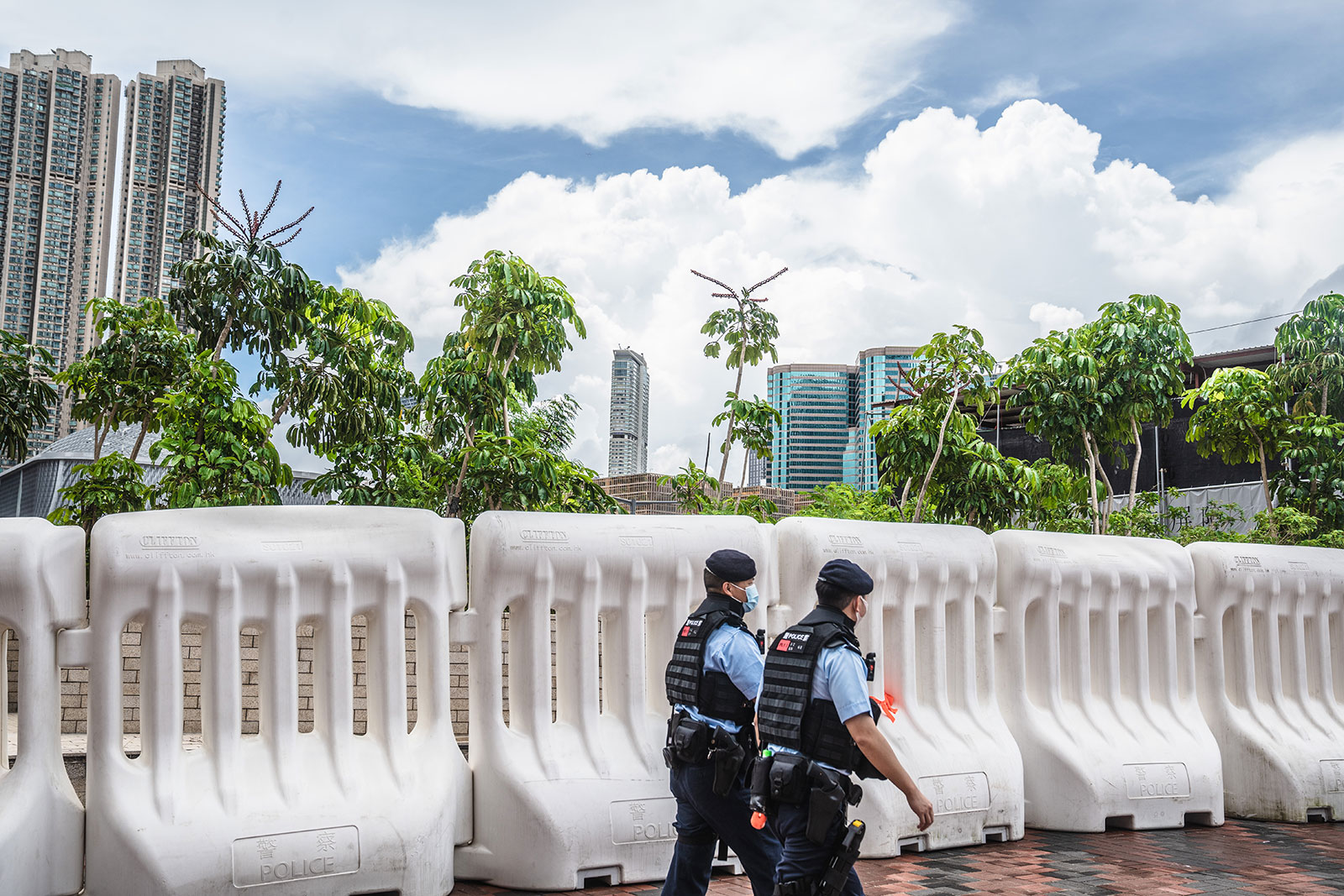
Chinese leader Xi Jinping’s visit to Hong Kong — his first outside mainland China since the pandemic began — appeared to be cast into doubt last week when two top officials from the city tested positive for the virus.
Erick Tsang, Secretary for Constitutional and Mainland Affairs, and Eric Chan, director of the Chief Executive’s Office, were placed into quarantine following their positive tests.
Their cases, which were identified before Chinese state media confirmed Xi’s visit, had raised questions over whether the leader would risk entering the city — now reporting more than 1,000 new Covid cases a day — given China’s stringent zero-Covid policy.
Under Xi, China stands isolated from the world in pursuing a zero-tolerance approach to the virus that has seen the country’s international borders shut and travel strictly curtailed.
But while Hong Kong has been heavily influenced by Beijing’s uncompromising health policies, it has so far avoided the type of prolonged city-wide lockdowns or compulsory mass testing seen in mainland cities such as Shanghai and Xi’an.
“Closed loop”: To prepare for the arrival of Xi and a delegation of state leaders from across the still largely sealed border with the mainland, the Hong Kong government introduced a robust “closed-loop” arrangement.
Under this system, which started last week, top officials could only travel between home and work by private vehicle and had to spend a night in a quarantine hotel last night, the eve of the handover anniversary. They are also subject to daily testing for Covid-19.
Zero-Covid: Despite high vaccination rates and a reduction in overall cases, the Hong Kong government remains committed to its own “zero-Covid” style policy, maintaining stringent social distancing and contact tracing measures, as well as tight border restrictions — including a mandatory seven-day hotel quarantine for all arrivals.
UK is doing “all it can” to hold China to its Hong Kong commitments, says Prime Minister Boris Johnson
From CNN’s Arnaud Siad in London
British Prime Minister Boris Johnson said on Thursday the United Kingdom is doing “all it can” to hold China to its commitments over “one country, two systems” in Hong Kong.
“Twenty-five years ago, we made a promise to the territory and its people and we intend to keep it, doing all we can to hold China to its commitments, so that Hong Kong is once again run by the people of Hong Kong for the people of Hong Kong,” Johnson said in a video statement.
He said with that declaration, “the foundations on which modern Hong Kong had been built, would go largely undisturbed,” but since then things have changed for the city.
“For a time, that was indeed the case. And Hong Kong and its people continued to thrive and flourish. But on the 25th anniversary of the handover, we simply cannot avoid the fact that for some time now, Beijing has been failing to comply with its obligations. It’s a state of affairs that threatens both the rights and freedoms of Hong Kongers and the continued progress and prosperity of their home,” he said.
Johnson said that was the reason the UK had given Hong Kongers a “pathway” to reside in the UK, with 120,000 people having set out down that path.
Some context: Hong Kong, a former British colony, is midway through the 50-year promise of “a high degree of autonomy,” given by Beijing under a framework known as “one country, two systems.”
For many years, Hong Kong enjoyed protected freedoms of speech, assembly, and press, drawing multinational companies into the city and a reputation as China’s “gateway to the West.” It was the only place on Chinese soil allowed to commemorate the 1989 Tiananmen Square massacre, or to openly hold pro-democracy protests and demand greater electoral reforms.
But in recent years, public fears have grown that the 50-year deadline has arrived early, as the city faced political upheaval, the introduction of a sweeping national security law by Beijing, and a crackdown on the city’s pro-democracy opposition groups.
Analysis: Xi Jinping brought Hong Kong to heel. Today he visits a city transformed
Analysis from CNN staff
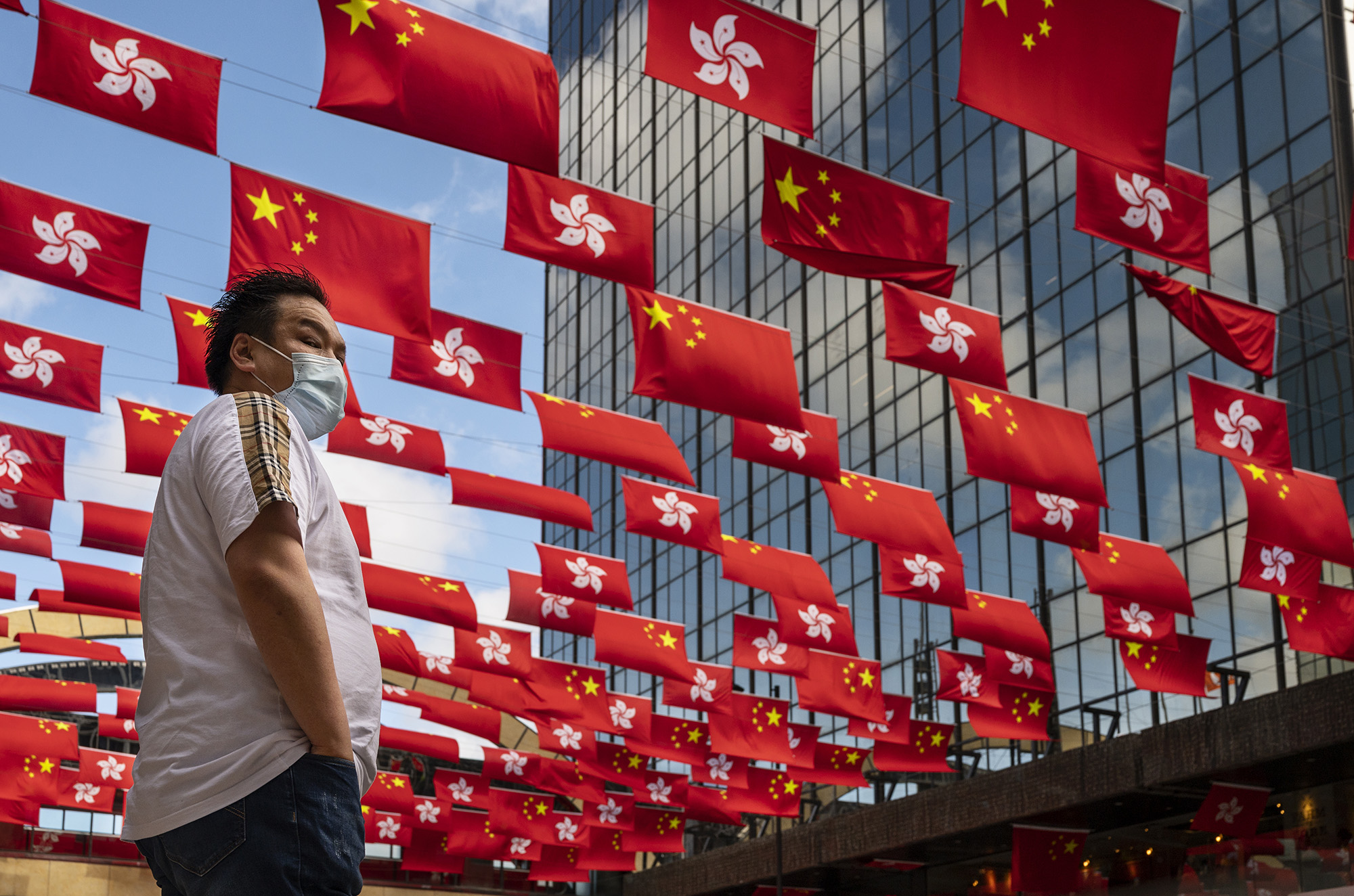
Chinese and Hong Kong flags fluttered above streets and red celebratory banners lined the harbor front, as thousands of Hong Kong police guarded the city’s high-speed rail terminus, during the arrival of Chinese leader Xi Jinping yesterday.
In his first trip outside mainland China since the start of the pandemic, Xi is in to Hong Kong to mark the 25th anniversary of its return to Chinese rule — a highly symbolic event at a pivotal time for both the city, and Xi himself.
The former British colony is midway through the 50-year promise of “a high degree of autonomy,” given by Beijing under a framework known as “one country, two systems.” It is also swearing in its newly appointed leader, hardline former police officer John Lee.
Xi, meanwhile, is only months away from finishing his first decade in power — and is widely expected to seek an unprecedented third term at a key meeting of the ruling Communist Party this fall.
The two-day trip is a timely declaration of political victory for Xi, who has brought Hong Kong to heel with a sweeping national security law following the 2019 anti-government protests. In just two years, critics say, the law has been used to crush the city’s opposition movement, overhaul its electoral system, silence its outspoken media and cripple its once-vibrant civil society.
The Hong Kong government has repeatedly denied the national security law is suppressing freedoms. Instead, it insists the law has ended chaos and restored stability to the city.
For an authoritarian leader obsessed with stability, Hong Kong may now feel more like home than ever. Unlike his previous visits to the city, Xi no longer needs to worry about any public expression of dissent — be it critical headlines on local newspaper front pages, protest slogans on billboards or mass rallies in the streets.
Instead, he is surrounded by only “patriotic” officials, loyal tycoons and a blanket of heavy security measures — including extensive roadblocks and a citywide ban on drones. He is also separated from the public by a meticulously maintained “closed loop” system — put in place to protect him against the city’s rising Covid-19 infections.
Read the full analysis here.
Why is Chinese leader Xi Jinping in Hong Kong today?
From CNN’s Kathleen Magramo in Hong Kong
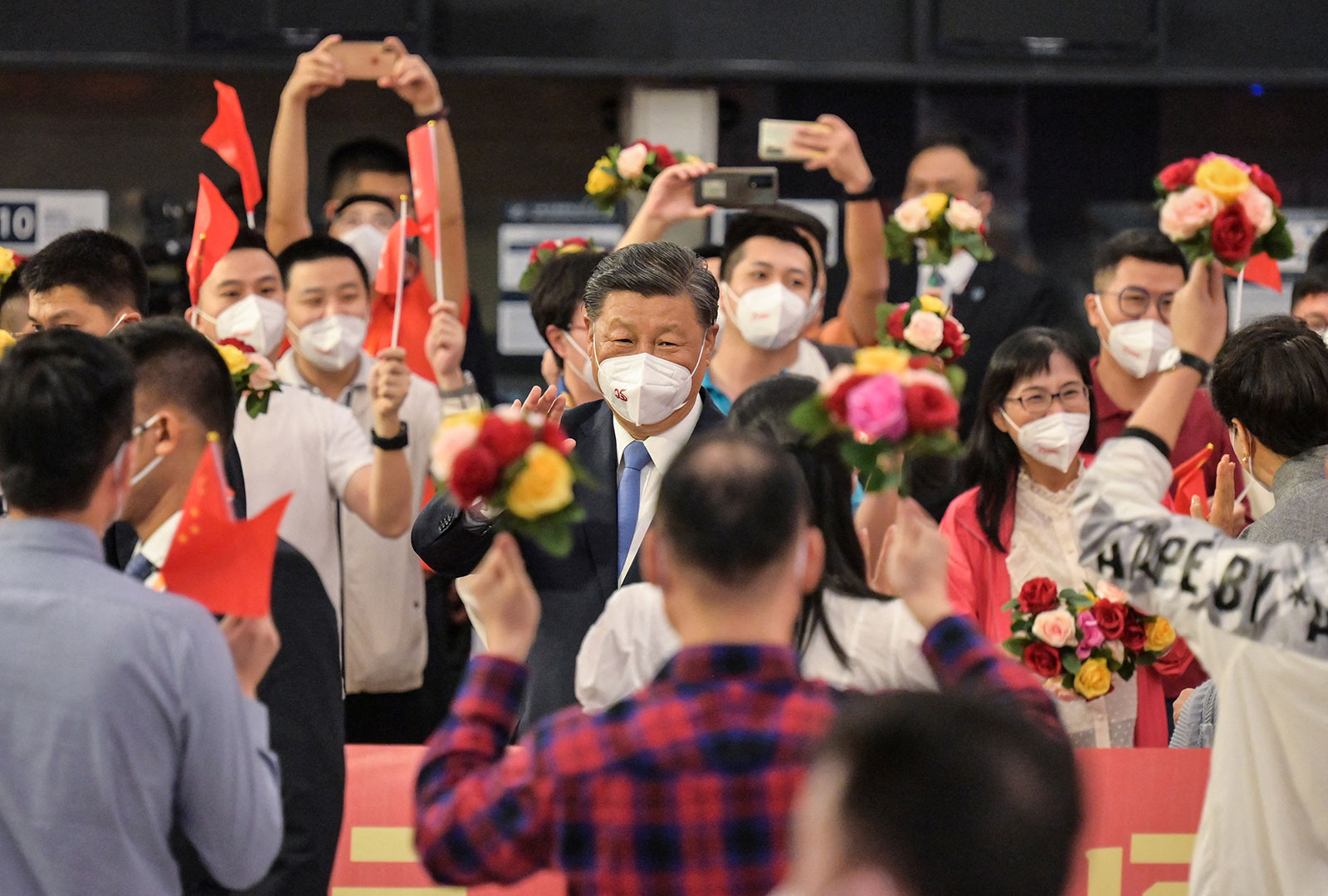
Chinese leader Xi Jinping has stepped out of mainland China for the first time since the pandemic began for two main reasons — to oversee ceremonies marking the 25th anniversary of Hong Kong’s handover from Britain to China and to formally swear in the city’s new leader.
In the almost 900 days since Xi last left the mainland on January 17, 2020, his diplomatic activities have been limited to virtual summits and video conferences, lending particular significance to his Hong Kong trip.
Handover anniversary: British colonial rule over Hong Kong ended on July 1, 1997 after 156 years, as the city came under Beijing’s control.
The former colony is now midway through the 50-year promise of “a high degree of autonomy,” given by Beijing under a framework known as “one country, two systems.”
Attending the handover anniversary festivities is highly symbolic for Xi, who wants to be seen as propelling a “national rejuvenation.”
New Hong Kong leader: Former security chief John Lee will be sworn in as Hong Kong’s Chief Executive today, with Xi presiding over the ceremony.
Lee is a hardline former police officer who took on the city’s pro-democracy protesters. He oversaw the arrests of dozens of activists and raids on newsrooms when he was security chief. Lee replaces outgoing leader Carrie Lam following her turbulent five-year term.
Some context: In what the government billed as an “open, just and honest” election, a largely government-appointed, pro-Beijing committee of 1,461 people appointed Lee the next leader for the city’s 7.5 million residents in a May 8 vote. Lee was the only person in the running, in contrast to previous years that saw run-offs between multiple candidates.
Hong Kong residents do not have the right to directly vote for the chief executive.
Source: https://www.cnn.com/asia/live-news/hong-kong-china-anniversary-07-01-22-intl-hnk/index.html

















